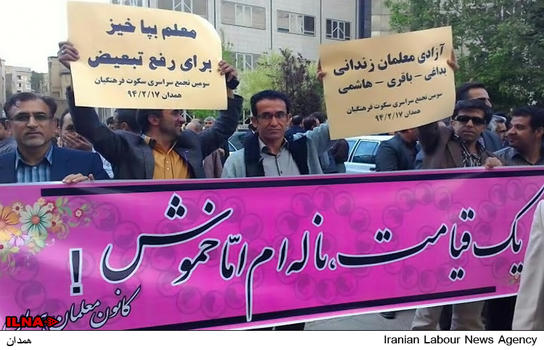Teacher Protests Sweep Iran despite Threats by Officials Not to Participate
Thousands Gather in Many Cities to Call Attention to Wages below the Poverty Line
Another nationwide protest by Iranian teachers swept through dozens of cities throughout Iran on May 7, with thousands taking to the streets to draw attention to wages that are below the poverty line.
Retired teacher and activist Hashem Khastar told the International Campaign for Human Rights in Iran that although the gathering in the city of Mashad was attended by a large number of police officers who treated the teachers respectfully, many of the teachers had been summoned and threatened not to participate in the protests the day before.
ILNA News Agency estimated that about 3,000 teachers gathered in front of the Parliament in Tehran alone. Teachers gathered outside Education Ministry offices in other cities as well, including Isfahan, Tabriz, Mashad, Sanandaj, Boushehr, Bandar Abbas, Shiraz, Rasht, Zanjan, Hamedan, and Zahedan. This was the third time over the past year that teachers have demonstrated to protest their wages.
The educators are asking for pay raises that would place their income above the poverty line and in a position to combat Iran’s high inflation rate. The protests were also in support of the release of teachers who have been imprisoned because of their activism.
During the protests, teachers held pickets with slogans such as “Poverty Line 3 Million [toman], Our Salary 1 Million [Toman],” “Free Imprisoned Teachers Bagheri & Hashemi,” and “State TV Censors Teachers’ Cries,” according to ILNA.
ILNA also reported that one day before the gatherings, an unspecified security organization summoned several teachers’ rights activists, and only released them after they promised not to participate in the nationwide protests.
Hashem Khastar, a representative for the Khorasan Province Teachers Union and a former political prisoner, told the Campaign that the day before the scheduled protests several individuals had been threatened with enforcement of their outstanding prison sentences if they participated in the May 7 protests.
“They also threatened [imprisoned teacher] Rassoul Bodaghi in prison with a brand new case against him, if he sends messages or poems out of the prison during these days,” Khastar said.
Asked whether officials have so far provided any responses to the protests, Khastar said, “Unfortunately, when teachers gather, in order to disperse the crowd as soon as possible, the officials invite us to negotiations, but nothing ever happens after the negotiations. Teachers have come to the conclusion that in order to realize their rights they must not keep silent anymore.”
Although ILNA referred to the nationwide gatherings as “silent gatherings,” Khastar told the Campaign that the teachers chanted slogans about their wages and the imprisoned teachers for hours.
One day ahead of the protests, Iran’s Supreme Leader Ali Ayatollah Khamenei warned during a meeting with teachers on the occasion of Teachers’ Day that the “enemy” wants to “bring up seditious slogans and create trouble for the regime on the pretext of the livelihood of the teachers.”
President Hassan Rouhani told teachers on May 4, that, “We recognize and regard as protected the right to dissent for all layers and guilds. I recognize the right of the teachers to protest. We know their problems and of course they also know our problems.”
“You saw this year, that for the first time Iranian workers took to the streets and demonstrated; something that was unprecedented in the past,” he added.
Nevertheless, independent unions remain banned in Iran, strikers and protest participants are often fired and risk detainment, and labor leaders face long prison sentences—all of which is prohibited by the International Labor Organization (ILO), as well as other international covenants, to which Iran is a member.







